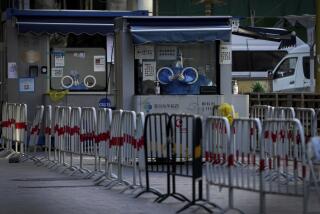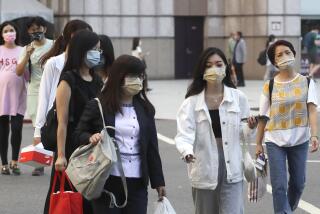Taiwan Takes No Chances on SARS
KEELUNG, Taiwan â The police had masks over their faces as they bounded up the stairs. They leaned on the buzzer of a third-floor apartment while photographers and neighbors hovered.
When the door opened, cameras flashed, illuminating the very surprised face of a middle-aged man in a T-shirt and sweatpants.
This was no fugitive sought for some heinous crime but a 57-year-old plastics manufacturer who had done nothing more extraordinary than make a business trip to China and Hong Kong. The police were paying a surprise visit to make sure he was at home and not violating Taiwanâs new rule requiring anybody who has visited an area heavily affected by severe acute respiratory syndrome to spend 10 days in quarantine.
This self-governing island -- which as of Wednesday had the worldâs third-highest SARS death toll with 31 -- is implementing among the most drastic measures in Asia to contain the contagion. Doctors and nurses have been locked into their workplaces. Journalists have been threatened with arrest for entering quarantined hospitals. A 17-year-old boy who violated a quarantine order to go to school was fined $1,700. Other violators of the regulations have been hauled off to military camps, while 2,000 surveillance cameras are being installed to prevent those quarantined from leaving home. The capital, Taipei, is talking about rounding up the homeless for fear they might spread the disease.
Such measures are generally welcomed by a public panicked about contracting SARS. Concerns have arisen, however, for basic human rights.
Such fears are especially acute in Taiwan, which only in 1987 rid itself of martial law. For Taiwanese, their homelandâs fledgling democracy is something residents point to when asked to explain why they want their largely unrecognized state to remain separate from China.
âSome kind of quarantine is acceptable, but what we worry about is overreaction and discrimination,â said Fort Fu-te Liao, an Oxford-educated jurist who is helping to draft a new human rights law for Taiwan.
Drawing an analogy between the fight against SARS and the anti-terrorist measures taken by the United States after the Sept. 11 attacks, Liao added: âWe want to make sure that these measures are temporary and donât become an excuse for laws that conflict with human rights.â
Officials reported two new outbreaks in hospitals and isolated cases in remote southern reaches of the island. National Taiwan University Hospital, Taipeiâs most prestigious, was virtually closed as 250 medical staff members and hundreds of patients were quarantined. Sixteen people in the hospital are suspected of having the disease. Chang Gung Memorial Hospital in the southern county of Kaohsiung also was quarantined.
The disease is spreading at an alarming rate despite emergency measures enacted May 2 that extend the powers of the military and government to fight SARS. One allows use of âmilitary force to keep order over quarantine areas.â Another gives the government âpriority over using the nationâs media and equipment.â
Keelung, a port city 15 miles northeast of Tapei, is taking no chances and is sending quarantine police from door to door to make sure people are complying with the law.
One morning last week, a convoy of police cars and municipal vans cruised through streets pungent with the aromas of disinfectant. Its quarry was people who had recently returned from Hong Kong, China, Singapore or Toronto and might not be abiding by the quarantine law.
âWhen you have a matter of life and death, you canât be too concerned about peopleâs freedom,â said Hsu Ting-chun, the cityâs director of civil services, wearing a surgical mask.
Bradley Chen, the businessman whose apartment was visited by the squad, said the police also had been telephoning him three times a day to make sure he was home and to demand that he take his temperature.
âI was really surprised when they came to the door,â said Chen.
The most controversial practice in Taiwan has been the placing of entire hospitals under quarantine, sometimes trapping healthy people inside with SARS patients. On April 24, officials locked the doors of Ho Ping municipal hospital in Taipei with more than 1,000 people inside. There was such panic to escape that some people tried jumping from windows. One man hanged himself, in the mistaken belief that his wife had SARS.
Health authorities also ordered that thousands of people -- off-duty doctors and nurses and people who had visited just to pick up prescriptions -- return to the hospital to be quarantined. Many went into hiding.
âThe demand to quarantine us together with patients is a death sentence,â one nurse wrote to a Taipei newspaper.
Meanwhile, two journalists who reported from inside Ho Ping during the quarantine about the poor conditions there were threatened with criminal prosecution, had their equipment confiscated and were ordered to undergo two weeks of quarantine in a military detention center.
Lee Yo-rou, a 33-year-old reporter from Next Magazine, a Tapei weekly, said that she and a photographer sneaked into the hospital the day after the quarantine was announced.
âWe were not doing anything illegal or unethical. We knew we would have to be quarantined. But they really tried to punish us with the quarantine laws because they did not like what we wrote,â Lee said by cell phone from inside a quarantined apartment building. (The military ultimately did not put Lee and the photographer in the detention camp, she said, because they feared the journalists would report on conditions there.)
Few Taiwanese argue against the necessity of quarantines. What they question is how the new rules are being enforced.
Chou Nien, a 45-year-old electronics factory worker, was ordered to undergo a 14-day quarantine after going to Ho Ping hospital to visit her husband, who was being treated for an unrelated illness. She voluntarily returned to the hospital. When she was transferred to another hospital May 5, she anticipated that she would have only three more days of confinement.
But then health authorities informed her that the two-week quarantine period would start all over again because somebody in the hospital had a fever.
âI am in a locked room being treated like a criminal,â Chou said by telephone.
Human rights advocates see a danger in addition to overzealous authorities. They fear that the public in its panic will engage in a witch hunt against anything or anybody suspected of having a connection with SARS.
Said Liao, the law professor: âYou hear now about children whose parents made trips to Hong Kong or China, and now people donât want them to come to school. Thatâs going too far.â
Taiwanâs prime minister, Yu Shyi-kun, has put it this way: âWe may survive SARS, but what about Taiwanâs humanity?â
More to Read
Sign up for Essential California
The most important California stories and recommendations in your inbox every morning.
You may occasionally receive promotional content from the Los Angeles Times.










